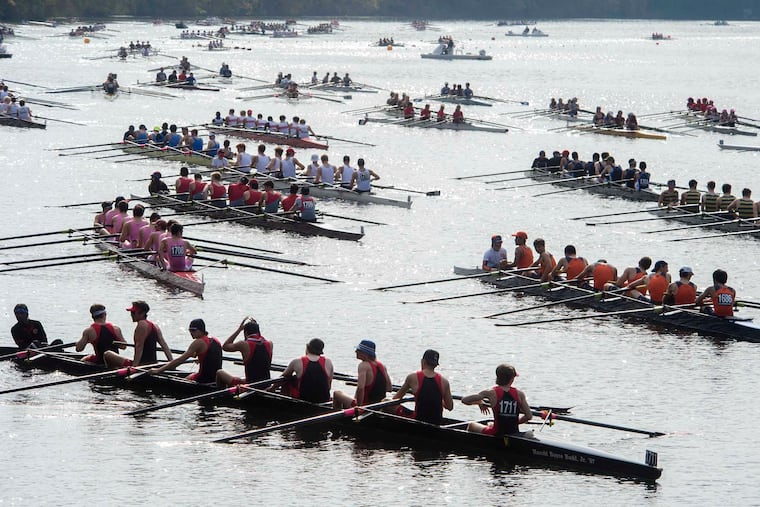The Head of the Schuylkill Regatta is an ‘experience’ for rowers nationwide. Meet the woman behind the event.
Jennifer Wesson, the executive director of HOSR, has helped expand rowing in the area for two decades. She strives to create an environment where people feel connected.

Jennifer Wesson can still recall flyers hung around a lamp post on Rutgers’ campus that read, “Come try out for rowing.” Although she knew little about the sport, the opportunity intrigued her.
Growing up in Audubon, Wesson frequently saw rowers compete as she drove through South Jersey. But at the time, the access for youth competitors was limited.
When Wesson graduated from Rutgers in 1998, she had three years of rowing experience under her belt after walking on to the team. She wanted to continue her involvement and introduce others to the sport.
“It really enhanced my college experience, being part of a team — I missed that,” said Wesson, who played tennis and softball at Audubon High School.
“Once you get out on the water, there’s just a connection with nature and working hard that drives something in you that you’re not able to let it go. It didn’t necessarily come easy for me. But it was something that I knew I would always want in my life.”
In the last 20 years, Wesson helped establish the first high school rowing club in South Jersey, coached at the college level, and, since 2016, served as the executive director of the Head of the Schuylkill Regatta, the second largest regatta in the U.S.
The HOSR is one of the largest regattas run by a woman, and returns this weekend for its 53rd year.
The two-day event, held Saturday and Sunday, will feature more than 8,500 competitors from ages 14-84, and has 270 teams from 28 states, including a large contingent from the tri-state area.
Local high school teams entered include Mount Saint Joseph Academy, Springside Chestnut Hill Academy, Conestoga, and Haddon Township. Temple also has 17 boats competing this year.
“We very much pride ourselves on not just being a regatta but being an experience,” Wesson said. “We want it to be an event that Philadelphians and local folks can take pride in as their own. We’d like visitors to want to come back to the city over and over again.
“We have high school and college kids that visit, and while they’re here we want them to say, ‘I want to live here,’ because that was exactly my experience when I rowed here for the first time.”
Before taking over the executive position, Wesson had volunteered with the HOSR since 2004. Her coaching career started at Lower Merion. During her one-year stint with the program, she met a parent who had a desire to start a club in South Jersey.
Wesson started connecting with high schools in the area, including Morristown, Haddonfield Memorial, Bishop Eustace, Shawnee, and Haddon Township.
Four local families that Wesson said also wanted to see the expansion of rowing helped with the initial funding, before the Camden County took notice.
“We started out buying a couple of ergs, put them in someone’s backyard and their garage,” Wesson said. “From there, we started recruiting within the towns, talking to people about the lore of rowing. A lot of it was folks that had not found a sport for them yet or maybe had not made a team in another sport.
“Then it was a matter of buying used boats, securing land security and racks to store them. Also having access to the water is a big deal.”
Initially, the high school programs rowed out of a boatyard, until 2006, when the Camden County Boathouse was built along the Cooper River on Park Drive in Pennsauken.
It was a major “stepping stone,” for the rowing community, Wesson said.
“This is something our residents want,” she said. “This is something that has the support of folks, and really was the reason the boathouse was ultimately able to be fundraiser and built, because of those first generation of rowers that rode out of that boatyard.”
Wesson served seven years as a program director and head women’s coach for the Moorestown rowing club. After that, she joined Temple’s women’s rowing program as an assistant coach for five years. On top of all her responsibilities, she also worked a full-time job as an environmental planner.
However, Wesson hit a point where she was ready to step back from coaching. It was a difficult decision, but she wanted to have a family.
“At that point in time, coaches were not being paid a salary that could substantiate living,” Wesson said. “You had to have another full-time job in order to coach and have a family. But I knew that I still wanted to be involved in working with kids in some way.”
It was important for her to serve as a leader in her community after the birth of her son.
She felt fulfilled by giving others access to rowing. Since becoming the executive director, which is a full-time position, Wesson has seen more youth and female rowers take part in the sport.
The event, however, isn’t necessarily about growing its numbers each year. It’s about putting forth a quality race, Wesson said, while creating an environment where people feel connected.
“While I was in high school, I didn’t know what I was missing,” she said. “If young people see a woman in a position of leadership, it certainly shows them what they themselves can do later on in life. It’s not my driver, but there’s still those missing opportunities.
“The more we keep pressing and coming together as a community, the less those opportunities will be missed. [HOSR] gives people that opportunity to thrive.”